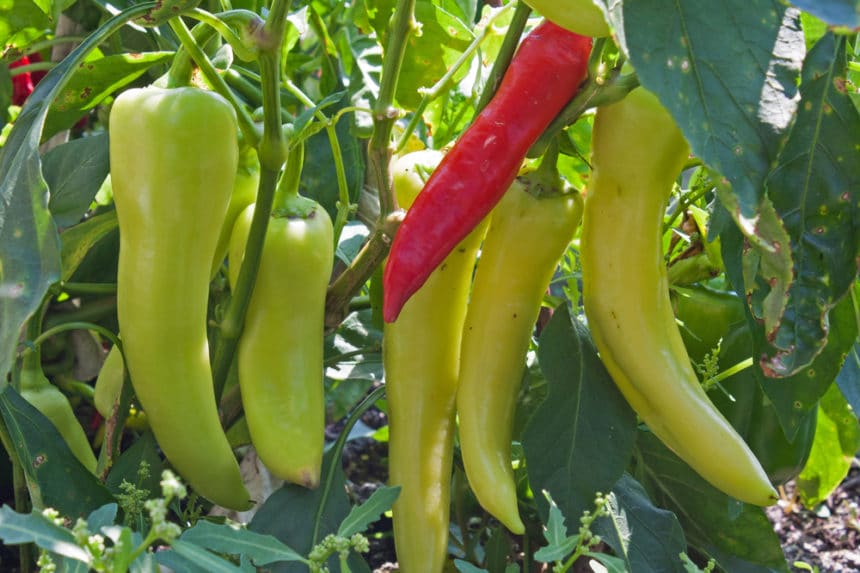Every good sandwich is incomplete without a bit of tang. And while onions and sour pickles may do the trick, theres nothing like adding a small, sweet, sour, slightly spicy green pepper to the mix to break up the richness of ingredients like meat, cheese, and mayo. But are we talking about banana peppers or pepperoncini?
Theres no doubt the two are very similar — in fact, if you saw them both on the vine, you might not be able to tell the difference. Both peppers can appear yellow-green or green and have an elongated shape that is slightly curved at the bottom. If you bit into both, expect a sweet crunch with a burst of spicy, sour juice and seeds. They both belong to the species capsicum annuum, a class of peppers that also includes cayenne, shishito, serrano, and bell peppers. Considering their similarities, its easy to mistake banana peppers and pepperoncini for each other, and amidst the layers of a big sandwich, you may not even know which one youre eating. However, these two peppers differ in a few key ways.
The banana pepper (also known as the yellow wax pepper or banana chili) is a medium-sized member of the chili pepper family that has a mild, tangy taste.

What are banana peppers?
Once you see a whole banana pepper, youll understand exactly how it got its name. Also called banana chilis and yellow wax peppers, these little peppers are long, yellow, or yellow-green and slightly curved like the fruit that bears their name. Thats where the similarities between bananas and these peppers end, however, as they have different flavors and textures and are not related at all. Banana peppers originally came from Hungary and are often mistaken for the much-spicier Hungarian wax peppers.
If you taste a banana pepper, however, youll immediately realize that even those with a low spice tolerance can probably handle them. They are typically at least five times milder than a jalapeno and range from 0 to 500 on the Scoville heat scale, meaning that some banana peppers arent spicy at all. Theyre typically sold as either hot or sweet, although most peppers are a combination of the two flavors and have some added sourness, especially if theyre pickled. However, the riper a banana pepper is, the sweeter and milder it usually is.
Perhaps the most obvious difference between banana peppers and pepperoncini, at least from the outside, is in their skin. Banana peppers have smooth, waxy skin and a crunchy exterior, unlike pepperoncini.
While banana peppers are smooth and crisp on the outside, pepperoncini are wrinkly and usually sold jarred and pickled. Banana peppers typically have a pointy tip, but pepperoncini are generally round at the end and are about an inch smaller than banana peppers on average. Pepperoncini are also sweet, crunchy, and tangy, although theyre usually more sour than banana peppers due to the vinegar used when pickling. Because theyre mildly spicy, its easy to mistake a banana peppers flavor for a pepperoncinis, but these wrinkly peppers are typically a little spicier than their yellow siblings. For reference, pepperoncini usually range from 100 to 500 on the Scoville heat scale, meaning you wont find any that are completely mild.
And while banana peppers have Hungarian origins, pepperoncini come from Italy and Greece. Theyre also called golden Greek peppers, sweet Italian peppers, or friggitello by Italians. But although these two peppers came from different places, they have relatively similar nutritional value. Both peppers are high in vitamin C and iron, although pepperoncini also have fiber and calcium, while banana peppers are a good source of potassium and manganese. Its a good idea to watch your sodium consumption when eating pepperoncini, however — because theyre almost always sold pickled; even three of the peppers can contain as much as 400 mg of sodium.
When To Pick Banana Peppers (It’s Sooner Than You Think!) – Pepper Geek
FAQ
What is another name for banana peppers?
Are banana peppers and Pepperoncinis the same thing?
Are banana peppers in the same family as bell peppers?
Are Greek peppers banana peppers?
What is a banana pepper?
Banana peppers are mild chilies (0 to 500 Scoville heat units), with a tasty natural tang and sweetness to them, perfect for pickling or served raw on salads and sandwiches. Though while its shape and color help make banana peppers easier to recognize than many other chilies, there’s actually a lot of culinary confusion surrounding them.
What are the healthier substitutes of pepper?
Healthier substitutes of pepper are: 1. White pepper: It comes from the same fruit as the black pepper. The seed in the fruit gives us white pepper if you crack open the black pepper. 2. Green pepper: The harvesting of the fruit happens much earlier. It has mild taste and carry less heat than the black ones. 3. Pink pepper: These can also be grounded and can be used as a substitute for black pepper. It has sweeter taste and brings a rosy tone to the food. Because of its mild nature, you may have to compensate by adding a little more. 4. Papaya seeds: The seeds of the sweet fruit mimics black pepper once dried and grounded. Additionally, papaya seeds contain antioxidants and are highly nutritious.
Are banana peppers a chili pepper?
Banana peppers, also referred to as a yellow wax pepper, are technically a member of the chili pepper family. What are These Peppers? These tasty yellow wax peppers or banana chilies got their name because of their long, slightly curved shape, similar to the banana fruit.
What are the different types of banana peppers?
There are three common types of banana peppers to choose from at the store. Sweet banana peppers are ideal for cooking because of their unique flavor, and they are often used as substitutes for green pepper. Hot varieties of banana peppers reach almost 15,000 Scoville heat units, or SHU, and have waxy skin.
